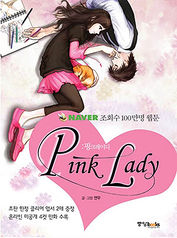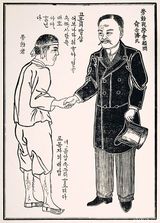Manhwa
| Manhwa | |
|---|---|
 Cover of Pink Lady, which originally had been published as a webcomic on Naver. |
|
| Korean name | |
| Hangul | 만화 |
| Hanja | 漫畫 |
| Revised Romanization | manhwa |
| McCune–Reischauer | manhwa |
Manhwa (Korean pronunciation: [manɦwa]) is the general Korean term for comics and print cartoons (common usage also includes animated cartoons). Outside of Korea, the term usually refers specifically to South Korean comics.[1]
Contents |
Manhwa style

Manhwa has been influenced by the dramatic modern history of Korea, resulting in a diversity of forms and genres, including a mainstream style similar to manga. Distinctive manhwa can be found in editorial comic strips, artistically-oriented works, and webcomics serials.
Typical characteristics of manhwa:
- The face and eyes are often exaggerated in a cartoon style while the figure is more realistic in proportion.[2]
- There is (usually) a more frequent use of gradient screentone.
- The left-to-right reading direction of the book.
- The Korean name of the author/artist. It is usually double-barreled and with syllables that do not exist in Japanese (usually the most reliable method of differentiating manhwa; exceptions being when a culturally-neutral pseudonym is used or when the artist is of Korean ethnicity but resides in another country).
- The Korean names of the characters in the manhwa.
- The untranslated sound effects (not always present) are in hangul.
There are now a number of publishers specializing in English translations of Korean comics, and by and large they are unafraid of calling them "manhwa." Though Korea's manhwa system developed later, the manga and manhwa industries can now be considered equal competitors, like "different brands of the same product."
Manhwa in the United States
Due to the explosion of manga's popularity in the America, many of the licensed titles acquired for the American market seek to emulate the popular elements of other successful series.[3] Recently, long-running webcomics serialized via Internet portal sites (e.g., Media Daum) and personal homepages have become both the creative and popular basecamp among the younger generation in Korea.
Direction of text
Manhwa is read in the same direction as English books, horizontally and from left to right, because hangul is normally written and read horizontally, although it can also be written and read like Chinese and Japanese: vertically from right to left, top to bottom.
Adaptation of term
The relative obscurity of Korean culture in the Western world has caused the word "manhwa" to remain somewhat unknown in the English-speaking world. Instead, English translations of manhwa have achieved success by targeting the manga and anime community, to the extent that manhwa are often marketed as "manga."
Animation and live-action adaptations
Unlike Japan, animations based on Korean comics are still relatively rare (though there were several major hits in the late 1980s and early 90s with titles such as Dooly the Little Dinosaur and Fly! Superboard). However, live-action drama series and movie adaptations of manhwa have occurred more frequently in recent years. Full House in 2004 and Goong ("Palace" or "Princess Hours") in 2006, are prominent examples as both have been counted as the best dramas of their respective years.
In 2007, The Great Catsby, an award-winning Korean webcomic, was adapted into a live-action drama, after a run as an on-stage musical in 2006. The title was also planned to be adapted into a feature film in late 2007.[4]
Priest, a manhwa that has been translated to English, will go into production as a movie by U.S. film studio Screen Gems. To be released in 2010,[5] it is produced by Sam Raimi, directed by Andrew Douglas, and will star Paul Bettany as the title character.[6][6]
War of Money is another dramatized manhwa that has become immensely popular in South Korea, garnering much attention for its Open Source Track (OST) soundtrack and actors.
In 2004, Blade of the Phantom Master, a popular manhwa, was adapted into an animated film by a joint Korean-Japanese animation team.
Korean manhwa publishers
- Topaz Agency Inc.
- Daewon C.I.
- Haksan Pubing Co., Ltd.
- Seoul Culture Corporation
- Shinwon Agency Corporation
North American manhwa imprints
- ADV Manga
- CPM Manhwa
- Dark Horse Manhwa
- DramaQueen
- DrMaster Publications
- Infinity Studios
- Media Blasters
- Netcomics
- NBM ComicsLit
- TOKYOPOP
- UDON's Korean Manhwa
- Yen Press
- Curtis Comic (defunct)
- ComicsOne (defunct)
See also
- Korean Wave
- Korean animation
- Manhua
- Manga
- List of manhwa by English title
- Contemporary culture of South Korea
References
- ↑ Glossary of Manga-Related Terms
- ↑ Brad Brooks; Pilcher, Tim. The Essential Guide to World Comics. London: Collins & Brown. ISBN 1-84340-300-5.
- ↑ Arnold, Andrew D. (2006-01-25). "Life and Literature Without Robots". Time. http://www.time.com/time/columnist/arnold/article/0,9565,1152700,00.html. Retrieved 2010-05-12.
- ↑ "The Great Catsby: Hit Korean Internet Comic Drama-tized into TV form debuts in 4 days". http://www.clumproll.com/2007/07/01/the-great-catsby-hit-korean-internet-comic-drama-tized-into-tv-form-debuts-in-4-days-6.php. Retrieved 2007-07-01.
- ↑ Paul Bettany to Join Screen Gems' Priest?
- ↑ 6.0 6.1 Olsen, Kevin Noel (January 25, 2007). "Amityville Director Set to Direct Priest Film Based on Tokypop Graphic Novel". Silver Bullet Comics.
- Son Sang-ik (1999) (in Korean). 한국만화통사 1 (General History of Manwha 1). Sigongsa. ISBN 8972598909.
- Hart, Christopher (2004). Manhwa mania : how to draw Korean comics. New York: Watson-Guptill Publications. ISBN 0-823029-76-X.
- Kim Jinsu (2007-06-02). "개화기 일제의 시사만화 탄압 (The Japanese oppression on Sisa manhwa)" (in Korean). Chammalo. http://www.chammalo.com/sub_read.html?uid=7283§ion=section3§ion2=.
- "만화" (in Korean). Empas/ Encyclopædia Britannica. http://100.empas.com/dicsearch/pentry.html?i=136069#T3.
- "Manhwa" (in Korean). Empas/ EncyKorea. http://100.empas.com/dicsearch/pentry.html?s=K&i=284131&v=46.
- Sim Ji-hoon. "Korea Manhwa Museum" (in Korean). INISteel Webzine. http://www.inisteel.com/news/webzine/200401/webzine_iniinfromation01.html.
- Sugiyama, Rika (2004). Comic artists — Asia : manga, manhwa, manhua. New York: Harper Design International. ISBN 0-060589-24-8.
External links
Manhwa information
- "Understanding Manhwa": history, culture, recommendations, etc.
- "Korean Comics in the U.S., Part 1, Comic-Con International 2004," Jade Magazine.com, Sep. 2004
- "Korean Comics in the U.S., Part 2, Manhwa Sampler," Jade Magazine.com, Sep. 2004
- "Sang-Sun Park, Les Bijoux Comic Artist," Sequential Tart.com, Aug. 2004
- Manhwa site for "Demon Diary" (마왕일기)
- "Infinity Studios and Manhwa," Anime Tourist.com, 16 June 2004
- Manhwa from nine of Korea's best comic publishers for sampling/licensing to publishers worldwide
- Our Toys, Our Selves: Robot Taekwon V and South Korean Identity
- Cain, Geoffrey. "Will the Internet Kill the Manhwa Star?" The Far Eastern Economic Review, November 6, 2009.
Popular manhwa artists
Festivals
- Bucheon Manhwa Information Center
- Bucheon International Manhwa festival
- Seoul International Comics and Animation Festival
- Dong-a/LG International festival of comics and animation
Manhwa on mobiles
Associations
- Cartoon & Animation Society in Korea
- Seoul Cartoon
- The Korean Cartoonist Association
- Korean Women Cartoonist Association
- Amateur Comics Association
- Korea Amateur Comic Land
Information and studies
- Korean Society of Cartoon & Animation Studies
- Seoul animation center
- Puchon Cartoon Information Center
- The Korea Society Manhwa Exhibit
|
||||||||||||||